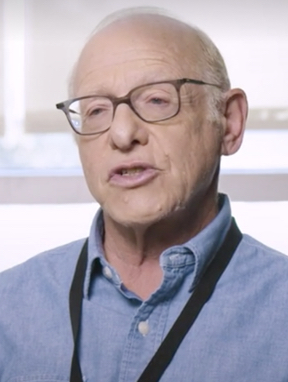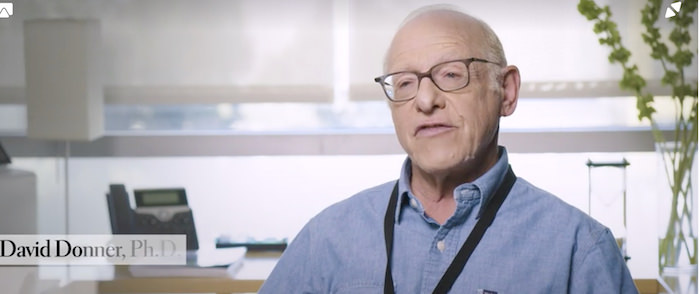
David Donner, Ph.D.
- Adjunct Professor
- Division of Surgical Oncology
Contact Information
San Francisco, California 94143-1932
(415) 353-9294
Fax: (415) 353-9296
[email protected]
Education
- Queens College, New York, NY, B.A., 1966, Chemistry
Biography
Dr. Donner is a molecular-cell biologist in the Surgical Oncology Research Laboratory. Dr. Donner received his undergraduate degree for Queens College of the City University of New York. He conducted doctoral research at Rensselaer Polytechnic Institute in the area of chemical evolution and the origins of life on earth.
His studies on chemical evolution contributed to the first Viking probe that searched for life on Mars. After postdoctoral studies in neurobiology conducted under the mentorship of Dr. George P. Hess at Cornell University, Ithaca New York, Dr. Donner joined the faculty of Cornell University Medical College and the Memorial Sloan Kettering Cancer Center in New York City. There Dr. Donner defined how mitogens, cytokines, and their receptors contribute to cancer.
Dr. Donner served an eight-year term as Director of the Biochemistry and Genetics Division at Sloan-Kettering as well as serving on the Executive Committee of the Institute. Dr. Donner has also served on numerous Editorial Boards and Grant Review Committees for the National Institutes of Health and as an Editor for "Endocrinology".
Dr. Donner moved from Sloan-Kettering to the Indiana University School of Medicine as Professor of Physiology, Microbiology and Immunology, and a Member of the Indiana University Cancer Center. Since joining the faculty of UCSF as Professor in Residence in the Department of Surgery and a member of the Helen Diller Comprehensive Cancer Center in 2005, Dr. Donner's laboratory has focused its efforts on identifying and understanding the functions of biomarkers that may predict the course and likelihood of recurrence of human colon cancer.
Dr. Donner is the recipient of numerous awards including the NIH Career Development Award, the American Cancer Society Faculty Research Award, Louise & Alston Boyer Young Investigator Award for Laboratory Research, American Diabetes Association Research and Development Award, NY State Regents Scholarship, and the NY State Scholar Incentive Award.
Research Overview
Dr. Donner's research is aimed at understanding how derangements in tumor suppressor-oncoprotein signaling networks are permissive of cancer. Of particular interest is how signaling through "death receptors" may sometimes induce cancer cells to undergo programmed cell death, yet in other instances may promote the aggressive growth and spread of malignancies. Recently, Dr. Donner's research group identified a novel factor called Sall2 that may act as a molecular switch to determine whether life or death signals predominate downstream of death receptors. Furthermore, the absence or presence of polymorphic forms of Sall2 appears predictive of whether colon cancer will recur. Considerable effort is being directed towards determining whether Sall2 may be a clinically useful biomarker that can predict the course of colon cancer and whether the malignancy will be responsive to therapy.
Research & Funding
- Tumor Necrosis Factor Action in CellsSponsor: NIH/NCISponsor ID: R01CA067891Funding Period:Feb 1997-Feb 2008Principal Investigator
- VASCULAR ENDOTHELIAL CELL GROWTH FACTOR IN PATHOLOGYSponsor: NIH/NCISponsor ID: R01CA073023Funding Period:Sep 1997-Jun 2004Principal Investigator
- TUMOR NECROSIS FACTOR RECEPTOR--STRUCTURE AND FUNCTIONSponsor: NIH/NCISponsor ID: R01CA044747Funding Period:Mar 1988-Feb 1994Principal Investigator
- GROWTH HORMONE ACTION IN CELLSSponsor: NIH/NIDDKSponsor ID: R01DK030788Funding Period:May 1982-Apr 1990Principal Investigator
- GROWTH HORMONE ACTION IN TARGET CELLSSponsor: NIH/NIDDKSponsor ID: K04DK001045Funding Period:Jul 1982-Jun 1987Principal Investigator
- TARGET CELL DESENSITIZATION IN PEPTIDE HORMONE ACTIONSponsor: NIH/NIADDKSponsor ID: R01AM022121Funding Period:Sep 1978-Apr 1986Principal Investigator
Publications
MOST RECENT PUBLICATIONS FROM A TOTAL OF 105
- Ricardo J. Antonia, Kan Toriguchi, Eveliina Karelehto, Dania Annuar, Luika Timmerman, Noura Tbeileh, Aras N. Mattis, Carlos U. Corvera, Kenzo Hirose, Eric K. Nakakura, David B. Donner, Robert S. Warren. Patient-derived organoids for personalized drug screening in intrahepatic cholangiocarcinoma. Journal of Clinical Oncology. 2020 Feb 1; 38(4_suppl):581-581. View in PubMed
- Donner DB, Nakakura EK, Venook AP, Lenz HJ, Zhang W, Hwang J, Bergsland EK, Lin MH, Toriguchi K, Antonia RJ, Warren RS. High thymidylate synthase gene expression predicts poor outcome after resection of hepatocellular carcinoma. PLoS One. 2019; 14(7):e0219469. View in PubMed
- Donner DB, Ruan DT, Toriguchi K, Bergsland EK, Nakakura EK, Lin MH, Antonia RJ, Warren RS. Mitogen Inducible Gene-6 Is a Prognostic Marker for Patients with Colorectal Liver Metastases. Transl Oncol. 2019 Mar; 12(3):550-560. View in PubMed
- Chamberlain CE, German MS, Yang K, Wang J, VanBrocklin H, Regan M, Shokat KM, Ducker GS, Kim GE, Hann B, Donner DB, Warren RS, Venook AP, Bergsland EK, Lee D, Wang Y, Nakakura EK. A Patient-derived Xenograft Model of Pancreatic Neuroendocrine Tumors Identifies Sapanisertib as a Possible New Treatment for Everolimus-resistant Tumors. Mol Cancer Ther. 2018 12; 17(12):2702-2709. View in PubMed
- K. Toriguchi, M. Lin, E. Nakakura, C. Corvera, B. Hann, D. Donner, R. Warren. An approach to patient-specific treatment of intrahepatic cholangiocarcinoma (ICC): drug screens with patient-derived spheroids identify mTOR as a viable and druggable target. Hepato Pancreato Biliary. 2018 Sep 1; 20:s690-s691. View in PubMed
- View All Publications
In the News
- SelectScience.net - Staff - January 20, 2020"In this video, Dr. David Donner, Director of the Surgical Oncology Research Lab at the University of California, San Francisco (UCSF) discusses the research taking place at the Surgical Oncology Research Laboratory at UCSF, and explains how he uses drug dispensing technology* and patient-derived organoids to enable vital research into liver malignancies, specifically metastatic colorectal cancer that has metastasized into the liver and intrahepatic cholangiocarcinoma. Donner also offers an [...]
